
Native Americans, also known as American Indians, First Americans, Indigenous Americans, and other terms, are the Indigenous peoples of the mainland United States. There are 574 federally recognized tribes living within the US, about half of which are associated with Indian reservations. As defined by the United States Census, "Native Americans" are Indigenous tribes that are originally from the contiguous United States, along with Alaska Natives. Indigenous peoples of the United States who are not listed as American Indian or Alaska Native include Native Hawaiians, Samoan Americans, and Chamorros. The US Census groups these peoples as "Native Hawaiian and other Pacific Islanders".
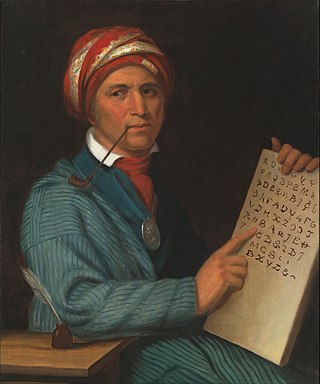
The Cherokee are one of the indigenous peoples of the Southeastern Woodlands of the United States. Prior to the 18th century, they were concentrated in their homelands, in towns along river valleys of what is now southwestern North Carolina, southeastern Tennessee, edges of western South Carolina, northern Georgia, and northeastern Alabama.

The Sac and Fox Nation is the largest of three federally recognized tribes of Sauk and Meskwaki (Fox) Indian peoples. Originally from the Lake Huron and Lake Michigan area, they were forcibly relocated to Oklahoma in the 1870s and are predominantly Sauk. The "Sac and Fox OTSA" is the land area in Oklahoma governed by the tribe.
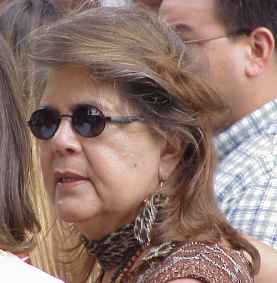
Wilma Pearl Mankiller was a Native American activist, social worker, community developer and the first woman elected to serve as Principal Chief of the Cherokee Nation. Born in Tahlequah, Oklahoma, she lived on her family's allotment in Adair County, Oklahoma, until the age of 11, when her family relocated to San Francisco as part of a federal government program to urbanize Native Americans. After high school, she married a well-to-do Ecuadorian and raised two daughters. Inspired by the social and political movements of the 1960s, Mankiller became involved in the Occupation of Alcatraz and later participated in the land and compensation struggles with the Pit River Tribe. For five years in the early 1970s, she was employed as a social worker, focusing mainly on children's issues.
The Dawes Rolls were created by the United States Dawes Commission. The commission was authorized by United States Congress in 1893 to execute the General Allotment Act of 1887.
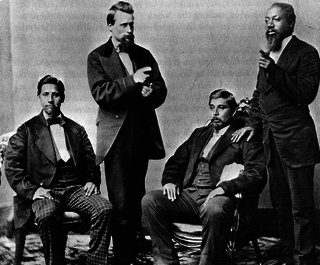
Blood quantum laws or Indian blood laws are laws in the United States that define Native American status by fractions of Native American ancestry. These laws were enacted by the federal government and state governments as a way to establish legally defined racial population groups. By contrast, many tribes do not include blood quantum as part of their own enrollment criteria.

The United Keetoowah Band of Cherokee Indians in Oklahoma is a federally recognized tribe of Cherokee Native Americans headquartered in Tahlequah, Oklahoma. According to the UKB website, its members are mostly descendants of "Old Settlers" or "Western Cherokee," those Cherokee who migrated from the Southeast to present-day Arkansas and Oklahoma around 1817. Some reports estimate that Old Settlers began migrating west by 1800. This was before the forced relocation of Cherokee by the United States in the late 1830s under the Indian Removal Act.
Black Indians are Native American people – defined as Native American due to being affiliated with Native American communities and being culturally Native American – who also have significant African American heritage.
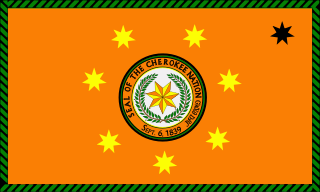
The Cherokee Nation, also known as the Cherokee Nation of Oklahoma, is the largest of three Cherokee federally recognized tribes in the United States. It was established in the 20th century and includes people descended from members of the Old Cherokee Nation who relocated, due to increasing pressure, from the Southeast to Indian Territory and Cherokee who were forced to relocate on the Trail of Tears. The tribe also includes descendants of Cherokee Freedmen, Absentee Shawnee, and Natchez Nation. As of 2021, over 400,000 people were enrolled in the Cherokee Nation.
In the United States, an American Indian tribe, Native American tribe, Alaska Native village, tribal nation, or similar concept is any extant or historical clan, tribe, band, nation, or other group or community of Native Americans in the United States. Modern forms of these entities are often associated with land or territory of an Indian reservation. "Federally recognized Indian tribe" is a legal term of art in United States law with a specific meaning.
The Cherokee Freedmen controversy was a political and tribal dispute between the Cherokee Nation of Oklahoma and descendants of the Cherokee Freedmen regarding the issue of tribal membership. The controversy had resulted in several legal proceedings between the two parties from the late 20th century to August 2017.

David Cornsilk is a professional genealogist and served as the managing editor of the Cherokee Observer, an online news website founded in 1992. He founded of the grassroots Cherokee National Party in the 1990s, seeking to create a movement to promote the Nation as a political entity. While working as a full-time store clerk at Petsmart, he "took on America’s second-largest Indian tribe, the Cherokee Nation, in what led to a landmark tribal decision. Cornsilk served as a lay advocate, which permits non-lawyers to try cases before the Cherokee Nation’s highest court." Cornsilk had worked for the nation as a tribal enrollment research analyst and for the Bureau of Indian Affairs as a genealogical researcher. He also has his own genealogical firm.
Cherokee heritage groups are associations, societies and other organizations located primarily in the United States. Such groups consist of persons who do not qualify for enrollment in any of the three federally recognized Cherokee tribes. As the Cherokee Nation enrolls all people who can prove descent from a Cherokee ancestor, many of these groups consist of those who claim Cherokee ancestry but have no documentation to prove this heritage. A total of 819,105 Americans claimed Cherokee ancestry in the 2010 Census, more than any other named ancestral tribal group in the Census.
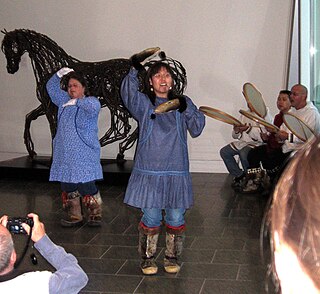
Native American identity in the United States is an evolving topic based on the struggle to define "Native American" or "(American) Indian" both for people who consider themselves Native American and for people who do not. Some people seek an identity that will provide for a stable definition for legal, social, and personal purposes. There are a number of different factors which have been used to define "Indianness," and the source and potential use of the definition play a role in what definition is used. Facets which characterize "Indianness" include culture, society, genes/biology, law, and self-identity. An important question is whether the definition should be dynamic and changeable across time and situation, or whether it is possible to define "Indianness" in a static way. The dynamic definitions may be based in how Indians adapt and adjust to dominant society, which may be called an "oppositional process" by which the boundaries between Indians and the dominant groups are maintained. Another reason for dynamic definitions is the process of "ethnogenesis", which is the process by which the ethnic identity of the group is developed and renewed as social organizations and cultures evolve. The question of identity, especially aboriginal identity, is common in many societies worldwide.

American Indian tribal recognition in the United States most often refers to the process of a tribe being recognized by the United States federal government, or to a person being granted membership to a federally recognized tribe. There are 574 federally recognized tribal governments in the United States. Non-Acknowledged Tribes are tribes which have no federal designation as sovereign entities. This is not to be confused with recognition of Native Americans in the US which are defined by the BIA as any descendant of the Indigenous peoples of the Americas which is a US citizen. Federally Non-Recognized tribes refers to a subgroup of non-acknowledged tribes which had some sort of recognition by the British prior to the formation of the United States or by the United States but which were determined by the government to no longer exist as an Indian tribe or no longer meet the criteria for a nation to nation status.
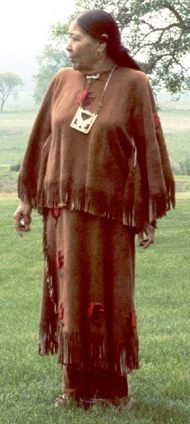
The Delaware Tribe of Indians, formerly known as the Cherokee Delaware or the Eastern Delaware, based in Bartlesville, Oklahoma, is one of three federally recognized tribes of the Lenape people in the United States, the others being with the Delaware Nation based in Anadarko, Oklahoma, and the Stockbridge-Munsee Community of Wisconsin. More Lenape or Delaware people live in Canada.

The Echota Cherokee Tribe of Alabama is a state-recognized tribe in Alabama and Cherokee heritage group. It is based in northern Alabama and gained state-recognition under the Davis-Strong Act in 1984.
The Cherokee Tribe of Northeast Alabama (CTNEAL), formerly the Cherokees of Jackson County, is a state-recognized tribe in Alabama. They have about 3,000 members. The tribe has a representative on the Alabama Indian Affairs Commission and the Inter-Tribal Council of Alabama. They are not federally recognized as a Native American tribe.
In the United States, tribal disenrollment is a process by which a Native American individual loses citizenship or the right to belong within a Native American tribe.
Cherokee descent, "being of Cherokee descent", or "being a Cherokee descendant" are all terms for individuals who have some degree of documented Cherokee ancestry but do not meet the criteria for tribal citizenship. The terms are also used by individuals who self-identify as Cherokee but without either documentation or community recognition.












